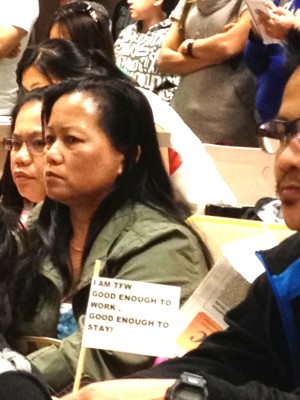Canada seriously looking at path to permanent status for TFWs
RED DEER, Alberta – Immigration Minister John McCallum has reiterated that giving temporary foreign workers a path to permanent status is as important as solving chronic labor shortages in Canada.
McCallum, the head of the Immigration, Refugees and Citizenship Canada (IRCC), in an email to INQUIRER.net Thursday, June 2, said that he prefers temporary foreign workers to have a route to permanent status.
“There are industries which need temporary foreign workers. There are chronic labour shortages,” McCallum stated. “Even after those industries look very hard under every rock for Canadians, they still can’t find them, and so they can justify some temporary foreign workers.”
“But the condition which we think is really important is that those temporary foreign workers be on the path to permanent residence. And I think, if they want to…they should have the opportunity,” he added, pointing out that this view reflects that of the Canadian government.
Coming overhaul
The government is poised to overhaul the Temporary Foreign Worker Program this year. This is the aim of a parliamentary review being undertaken by the Standing Committee on Human Resources, Skills and Social Development and the Status of Persons with Disabilities (HUMA) that started in May.
Following the review, the committee will draft a report to which the government will make a response in 120 days. Stakeholders will see changes to the TFW program later this year, the office of Employment, Workforce Development and Labour has said.
The review is tackling issues beleaguering the TFW program and the streams under it–-Seasonal Agricultural Worker Program, Caregiver Program and the program involving low-skilled workers.
The committee has heard from businesses, advocates and foreign workers who have criticized the program’s pitfalls as being employer-driven; restrictive in terms of the 4-in, 4-out rule; expensive due to the $1,000 labor market test fee per foreign worker. Critics have decried the exploitation workers face in the hands of their employers and recruitment agencies. The committee has until June 15 to outline its policy recommendations to the House of Commons.
Review process lambasted
However, Marco Luciano, Alberta coordinator Coalition for Migrant Worker Rights Canada (CMWRC) lambasted the review process. “It was disappointing. It felt like it was rushed,” said Luciano, whose group had wanted more migrant representation before the committee.
“[We] will continue to demand permanent residency to migrant workers here and upon arrival. We are demanding for mobility through open work permits and the removal of the oppressive 4-in, 4-out rule,” he added.
IRCC’s data shows that the number of TFWs who gained permanent status in Canada increased steadily in the last ten years. In 2015, there were some 9,007 foreign workers who became permanent residents. The biggest rise occurred in 2014 when there were some 9,785 TFWs who were granted permanent status, or 49 percent increase from the year before.
Meanwhile, foreign workers who have overstayed have the option to leave Canada and apply for authorization to return. However, immigration officers factor in history of violations when assessing new applications.
“The purpose of Canada’s work permit programs is to fill temporary needs. Workers agree in their application that they are coming to Canada to work temporarily,” said IRCC spokesperson Nancy Caron.
“Foreign workers are expected to abide by the conditions of their work permit, including ending their employment and leaving the country when their work permit expires, unless they have another legal status in Canada,” said Caron.
“When the Canada Border Services Agency (CBSA) becomes aware of situations where foreign nationals have contravened the Immigration and Refugee Protection Act, for example, overstayed their visas, they investigate and take the appropriate action mandated by law, including removing the individual from Canada,” she added
